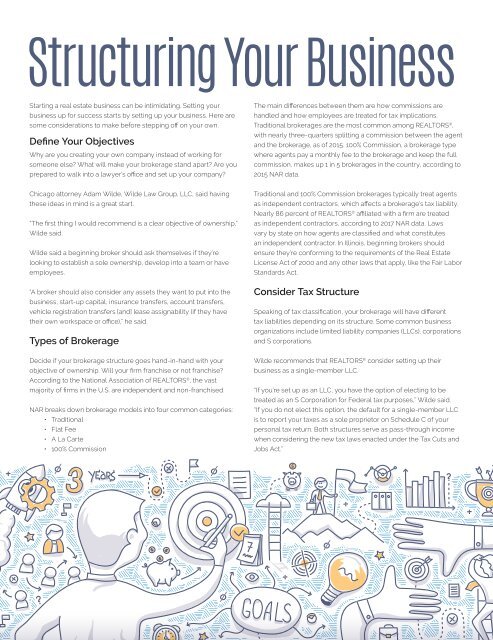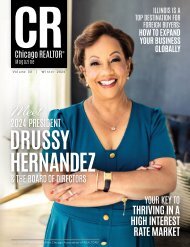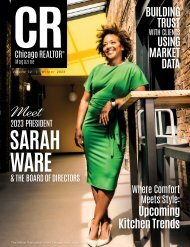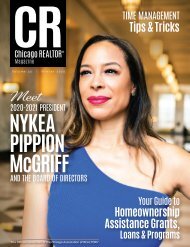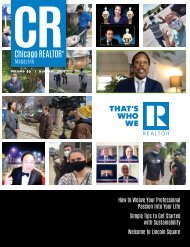CR Magazine – Autumn 2018
The official publication of the Chicago Association of REALTORS®.
The official publication of the Chicago Association of REALTORS®.
Create successful ePaper yourself
Turn your PDF publications into a flip-book with our unique Google optimized e-Paper software.
Structuring Your Business<br />
Starting a real estate business can be intimidating. Setting your<br />
business up for success starts by setting up your business. Here are<br />
some considerations to make before stepping off on your own.<br />
Define Your Objectives<br />
Why are you creating your own company instead of working for<br />
someone else? What will make your brokerage stand apart? Are you<br />
prepared to walk into a lawyer’s office and set up your company?<br />
The main differences between them are how commissions are<br />
handled and how employees are treated for tax implications.<br />
Traditional brokerages are the most common among REALTORS ® ,<br />
with nearly three-quarters splitting a commission between the agent<br />
and the brokerage, as of 2015. 100% Commission, a brokerage type<br />
where agents pay a monthly fee to the brokerage and keep the full<br />
commission, makes up 1 in 5 brokerages in the country, according to<br />
2015 NAR data.<br />
Chicago attorney Adam Wilde, Wilde Law Group, LLC, said having<br />
these ideas in mind is a great start.<br />
“The first thing I would recommend is a clear objective of ownership,”<br />
Wilde said.<br />
Wilde said a beginning broker should ask themselves if they’re<br />
looking to establish a sole ownership, develop into a team or have<br />
employees.<br />
“A broker should also consider any assets they want to put into the<br />
business, start-up capital, insurance transfers, account transfers,<br />
vehicle registration transfers [and] lease assignability (if they have<br />
their own workspace or office),” he said.<br />
Types of Brokerage<br />
Decide if your brokerage structure goes hand-in-hand with your<br />
objective of ownership. Will your firm franchise or not franchise?<br />
According to the National Association of REALTORS ® , the vast<br />
majority of firms in the U.S. are independent and non-franchised.<br />
NAR breaks down brokerage models into four common categories:<br />
• Traditional<br />
• Flat Fee<br />
• A La Carte<br />
• 100% Commission<br />
Traditional and 100% Commission brokerages typically treat agents<br />
as independent contractors, which affects a brokerage’s tax liability.<br />
Nearly 86 percent of REALTORS ® affiliated with a firm are treated<br />
as independent contractors, according to 2017 NAR data. Laws<br />
vary by state on how agents are classified and what constitutes<br />
an independent contractor. In Illinois, beginning brokers should<br />
ensure they’re conforming to the requirements of the Real Estate<br />
License Act of 2000 and any other laws that apply, like the Fair Labor<br />
Standards Act.<br />
Consider Tax Structure<br />
Speaking of tax classification, your brokerage will have different<br />
tax liabilities depending on its structure. Some common business<br />
organizations include limited liability companies (LLCs), corporations<br />
and S corporations.<br />
Wilde recommends that REALTORS ® consider setting up their<br />
business as a single-member LLC.<br />
“If you’re set up as an LLC, you have the option of electing to be<br />
treated as an S Corporation for Federal tax purposes,” Wilde said.<br />
“If you do not elect this option, the default for a single-member LLC<br />
is to report your taxes as a sole proprietor on Schedule C of your<br />
personal tax return. Both structures serve as pass-through income<br />
when considering the new tax laws enacted under the Tax Cuts and<br />
Jobs Act.”


